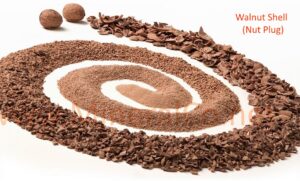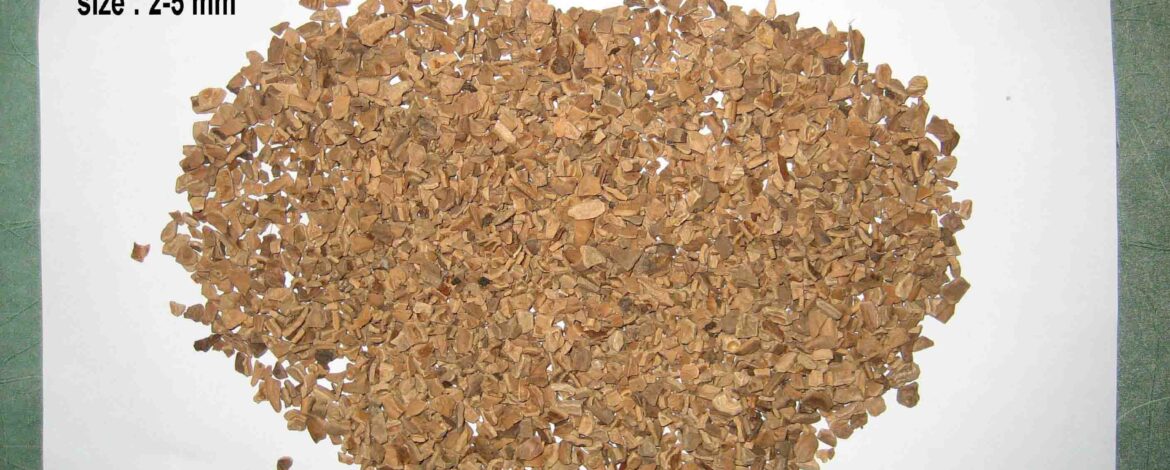Formation, Global Resources, and Industrial Uses
The Hidden Power of Walnut Shells
Walnut shells are a byproduct of the walnut industry but have found extensive applications in industrial, commercial, and environmental sectors. Known for their hardness, durability, and biodegradability, walnut shells are used in abrasives, cosmetics, filtration, and agriculture.
With large global walnut production, particularly in countries like China, the United States, Iran, and Turkey, walnut shells are an eco-friendly alternative to synthetic materials. This article explores how walnut shells form, where they are sourced, and their key industrial and commercial applications.

How Walnut Shells Are Formed in Nature
Walnut shells are formed as part of the natural growth cycle of walnut trees, which belong to the Juglans genus. Their formation involves several stages:
1. Growth and Development of Walnuts
- Walnut trees take 4–7 years to mature and start producing fruit.
- The fruit consists of three layers: the green outer husk, the hard shell, and the edible walnut kernel inside.
- The shell protects the nut and contributes to its long shelf life.
2. Hardening of the Walnut Shell
- As the walnut ripens, the outer husk dries and splits open, revealing the hard inner shell.
- The shell hardens over time due to natural lignin and cellulose deposits, creating a durable and impact-resistant material.
3. Harvesting and Processing
- Once walnuts are harvested, the shells are removed during processing and shelling operations.
- The shells are then crushed, ground, or processed into various sizes for different industrial applications.
Walnut shells are a sustainable byproduct that is recyclable and biodegradable, making them an environmentally friendly alternative to synthetic materials.
Global Resources of Walnut Shells
The availability of walnut shells depends on global walnut production. Some of the top walnut-producing countries include:
1. China – The Largest Global Producer
- Produces over 1.1 million metric tons of walnuts annually.
- Major walnut-growing regions include Yunnan, Shanxi, and Sichuan.
2. United States – A Key Supplier of Walnut Shells
- The U.S., especially California, accounts for over 30% of global walnut production.
- Industrial walnut shell processing is common in the Central Valley region.
3. Iran – A Major Exporter
- Produces around 450,000 metric tons of walnuts per year.
- High-quality walnut shells are widely used in abrasives and oil filtration.
4. Turkey, India, and Chile – Growing Walnut Industries
- These countries contribute significantly to the global walnut supply chain.
- Walnut shells are increasingly used in sustainable industrial applications.
With the growing demand for natural and eco-friendly materials, walnut shells are becoming an important industrial raw material worldwide.
Industrial Uses of Walnut Shells
1. Abrasive Blasting and Cleaning
Walnut shells are widely used as a natural abrasive in surface treatment applications, including:
- Industrial cleaning of machinery, engines, and delicate surfaces.
- Removing paint, carbon deposits, and coatings from metals and plastics.
- Polishing jewelry, glass, and automotive parts without causing scratches.
Unlike synthetic abrasives, walnut shells are biodegradable, non-toxic, and gentle on surfaces, making them ideal for eco-friendly industrial cleaning.
2. Oil and Water Filtration
Due to their porous structure, walnut shells act as a highly effective filtration medium for:
- Oil refining and wastewater treatment, removing contaminants.
- Petroleum and natural gas drilling operations, filtering drilling fluids.
- Swimming pool and industrial water purification for cleaner water systems.
Walnut shell filters are reusable, chemical-free, and long-lasting, making them a cost-effective and sustainable alternative to synthetic filtration media.
3. Energy Production and Biomass Fuel
Walnut shells serve as an eco-friendly biofuel, used for:
- Renewable energy production, replacing traditional fossil fuels.
- Charcoal alternatives in sustainable cooking and heating solutions.
- Pelletized biomass fuel, generating heat in industrial and residential applications.
Their high calorific value makes them a powerful renewable energy source, reducing carbon footprints in energy production.
4. Automotive and Aerospace Applications
The automotive and aerospace industries use walnut shells for:
- Cleaning aircraft engines, turbine blades, and aerospace components without damage.
- Polishing automotive parts, ensuring precision without surface erosion.
- Eco-friendly maintenance operations, reducing reliance on chemical cleaning agents.
Commercial Uses of Walnut Shells
1. Cosmetics and Personal Care
Walnut shells are a popular natural exfoliant in:
- Facial scrubs, body washes, and hand cleansers remove dead skin cells.
- Organic and sustainable beauty products, replacing plastic microbeads.
- Therapeutic skincare treatments, improving texture and hydration.
Their biodegradability and natural abrasiveness make them ideal for eco-conscious cosmetic formulations.
2. Agriculture and Soil Enhancement
Walnut shells play a significant role in sustainable farming, used as:
- Mulching material, retaining moisture, and suppressing weeds.
- Soil conditioner, improving aeration and drainage.
- Organic pest control, protects crops without harmful chemicals.
They help reduce agricultural waste while enhancing soil health and productivity.
3. Pet and Livestock Bedding
Crushed walnut shells are widely used as natural bedding for:
- Small animals and birds offer comfort and odor control.
- Livestock, including horses and poultry, provide a hypoallergenic alternative to synthetic bedding.
- Reptile enclosures, create a dust-free and absorbent habitat.
Their absorbent and biodegradable properties make them a sustainable choice for pet care and farming.
4. Eco-friendly crafting and Decoration
Walnut shells are used in creative and commercial products, including:
- Handmade crafts, jewelry, and decorative items add a natural touch.
- Natural dyes and pigments for textiles and artwork.
- Sustainable packaging materials, reducing plastic waste.
Their durability and aesthetic appeal make them valuable in artisan and green business industries.
Why Walnut Shells Are a Sustainable Resource
1. 100% Natural and Biodegradable
- No harmful chemicals or synthetic additives.
- Breaks down naturally, reducing environmental impact.
2. Recycled and Repurposed Waste Products
- Utilizes a byproduct of the walnut industry, reducing waste.
- Contributes to circular economy models in agriculture and industry.
3. Versatile Across Multiple Industries
- Used in cosmetics, energy, filtration, and industrial cleaning.
- An eco-friendly alternative to plastic-based abrasives and filters.
Conclusion: The Growing Demand for Walnut Shells
Walnut shells are a powerful natural resource with diverse applications in industrial, commercial, and environmental sectors. Their durability, eco-friendliness, and versatility make them a sustainable alternative to synthetic materials.
As industries shift toward greener and more sustainable solutions, walnut shells are gaining global recognition as a valuable raw material.

